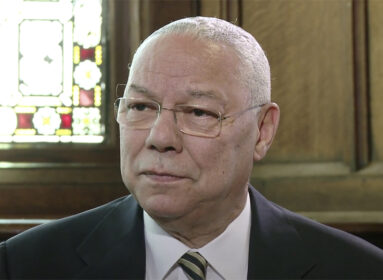By Cindy Mindell ~
WEST HARTFORD – Hebrew Health Care staff were hanging artwork for an exhibition by patients with dementia when the idea for a panel discussion came up.
“We started getting a lot of questions about the condition,” says Pamela K. Atwood, director of Life Enrichment and Dementia Care at Hebrew Health Care in West Hartford. “I do a lot of presentations on dementia, but many people are deathly afraid of getting Alzheimer’s and they don’t want to come talk to the ‘Dementia Lady.’ When we focus on some of the technical aspects of the diseases that cause memory problems, that’s threatening, but if we do so in the context of hope, that can be helpful.”
The resulting presentation, “Dementia and the Arts,” will be held on Sunday, Mar. 18, 2-3:30 p.m., at The Bushnell Center for the Performing Arts’ Autorino Great Hall.
The panel discussion coincides with the exhibit, “Elder Expressions: Their Lives, Their Loves, Their Cherished Memories,” on display through Apr. 22 in the Bushnell’s Promenade Gallery. In addition to Pamela Atwood, MA, participants will include Cathy Malloy, CEO of the Greater Hartford Arts Council; and Dr. Henry Schneiderman, MD, FACP, vice president of medical services and physician-in-chief at Hebrew Health Care. The panelists will discuss the role arts play in the lives of persons with dementia, and the importance of tapping into a patient’s cognitive reserve through the arts.
Hebrew Health Care has run arts programs for individuals with dementia and other age-associated illnesses since the mid-’90s. The art work produced by two of those programs is featured in the “Elder Expressions” exhibit at the Bushnell.
The Sadie Mindell Master Painting Program was started in 1996 to provide Hebrew Health Care residents opportunities for creative expression. The class meets twice a month and is facilitated by volunteer artists. While the primary medium is acrylic on canvas, some participants have also worked in oils or watercolors. While some residents have never painted before, others have lost physical abilities due to a stroke or other health condition and must learn new ways to create, Atwood says.
“A Fresh Canvas: An Alzheimer’s Arts Program,” funded since 2005 by the Bella and Max Shulman Family Fund at the Jewish Community Foundation of Greater Hartford, provides creative expression through art therapy, music therapy, and dance-movement therapy to people with progressive dementia in Hebrew Health Care’s skilled-nursing unit and adult day center. The goal of the program is to allow participants to use the creative process involved in artistic expression to resolve conflicts, develop interpersonal skills, reduce stress, and increase self-esteem and self-awareness.
“As a person who has worked with Alzheimer’s patients for more than 20 years, I know that our patients with dementia can still use arts to express themselves,” says Atwood. “But the challenge we had was that an art class can be frustrating because dementia impedes the path of information from the brain to the hands, so following the directions becomes difficult. The wording has to be changed so much. So if I say, ‘Draw love,’ that’s different from saying, ‘Draw a rose.’ It’s about creating an art piece from a totally different perspective – from the soul – and it focuses on the process, not the product. An Alzheimer’s arts program is designed to be failure-free.”
For some, dementia is a disinhibiting factor that leaves them freer to create, Atwood says.
Not only do the classes serve as a creative outlet for the patients; it also offers a way for the clients to connect with their family members and caregivers, Atwood says. “It provides a conduit with this person who is still there, despite the dementia,” she says. “We’ve had family members come in and look at a patient’s painting of a beach scene and say, ‘That’s his rowboat; he used to love to fish,’ and now they’re talking with their loved one about fishing.”
The art exhibit is meant not only to give validation to the creative abilities of those with dementia, but also to diminish the fear and stigma associated with aging and associated illnesses, Atwood says. The panel will give a voice to people who still exist, despite the cognitive and behavioral changes caused by dementia.
The Hebrew Health Care arts classes are a response to the belief that human development is ongoing. “Why do we not have structure at the end of life?” Atwood says. “Part of my philosophy as a gerontologist is that, until people draw their final breath, they’re still developing. We process the world and create meaning in the world through the arts. Without these programs, our clients, and those at senior-citizen centers and assisted-living centers, have no outlet. As their physical abilities change, we need to bring these opportunities to them.”
“Dementia and the Arts” panel discussion: Sunday, Mar. 18, 2 p.m., The Autorino Great Hall at The Bushnell Center for the Performing Arts, 166 Capitol Ave., Hartford. Admission is free and open to the public; registration required by Mar. 12. To register or for more information call (860) 523-3994 or email mfrancese@hebrewhealthcare.org
See Q & A with Dr. Henry Schneiderman, MD, FACP, vice president of medical services and physician-in-chief at Hebrew Health Care.







 Southern New England Jewish Ledger
Southern New England Jewish Ledger















